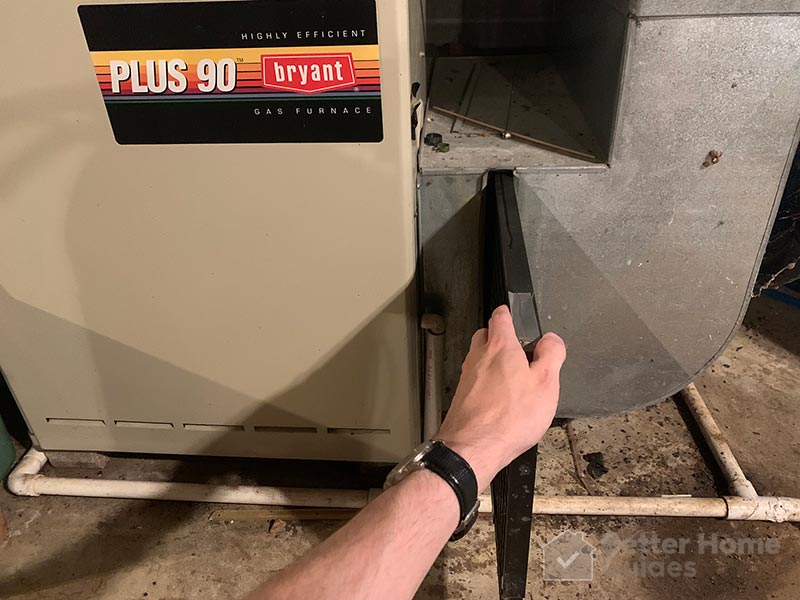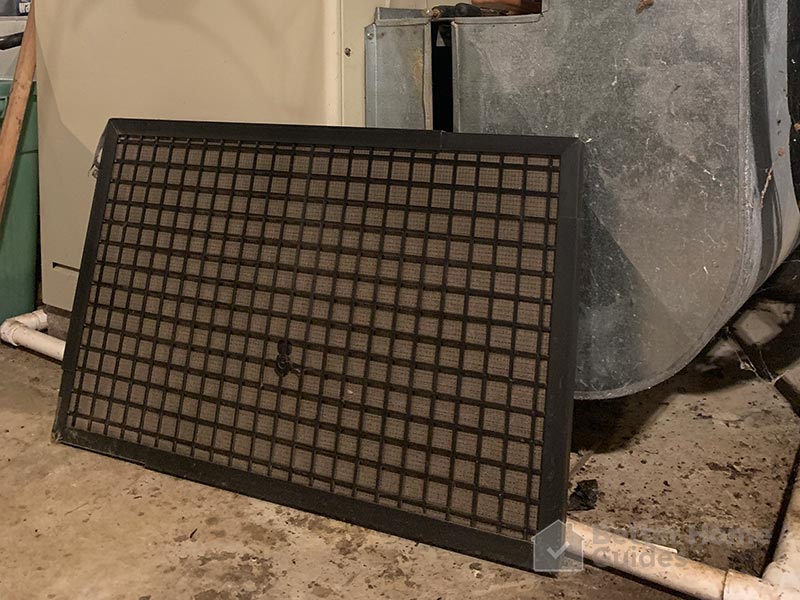As the cooler months approach, most homeowners want to do everything they can to support the overall health of their heating system.
Many homeowners take for granted all of the routine things they must do in order to make their home comfortable for the long winter months.
You may consider sealing your windows, insulating your pipes, and other common tasks, but what about changing your furnace filter?

The Short Answer: Most HVAC professionals will recommend replacing your furnace filter every 60-90 days in a home that is occupied year round. This is a general rule of thumb as there are several variables that can factor in such as pets and allergies.
The Long Answer: Understanding when to change your furnace filter can be a little complicated for some individuals. Every home is going to have its own set of needs based on the people who live there, the pets you may have, and how often you happen to be home. Even personal factors like your allergies will play a large role in how often your furnace filter needs to be changed.
So how often should you really change your filter? Most experts agree that the average family needs to change their furnace filter at least every ninety days. A fresh version should be installed at least once per season. However, you may find that you need to change the furnace filter more or less frequently based on the unique makeup of your home.
Do You Have Pets?
No matter what part of the world you live in, it’s likely that you are a part of a culture that prizes your pets as members of the family. Your beloved canine and feline friends are adorable furballs, but that can make a big impact on your furnace filter. With each individual pet that you add to your home, you are increasing the amount of pet dander, fur, and dust that are inside your home. Together, these items combine to clog up your furnace filter and reduce your HVAC system’s overall efficiency.
A good rule of thumb is to change your air filter every two months when you have one pet in the house. If your allergies are moderate to severe, you may need to change it every month. This also applies if you have multiple pets.
Allergies Mean More Frequent Changings
Some unfortunate individuals suffer from intense allergies that leave them with a stuffy nose, sneezing, and coughing. The likely culprit to your increased allergy symptoms is the dust, pet dander, and other air contaminants that are found in your home and collected by your furnace filter. The longer you leave these particles in the furnace filter, the more likely they are to find their way into your home again, causing an endless cycle of misery.
It’s time for you to break out of the pattern caused by poor indoor air quality. You should consider changing the filter at least once a month. However, those individuals with severe allergies may need to change the filter every other week.
What About Low Occupancy?
Are you a single person who lives alone in your home? Without the hustle and bustle of a large family, you probably aren’t stirring up nearly as many air contaminants. Particularly if you have no pets at home, you can often extend the lifespan of your air filter to four to six months.
A vacation home that is only occupied for a portion of the year is another consideration. With no one living in the home for the majority of the year, it’s okay to forego changing your furnace filter each month. In fact, most professionals believe that vacation homes only require new furnace filters every six to twelve months.
Does Changing Your Furnace Filter Matter?
When the winter months come along, you don’t want to be left out in the cold. It is imperative that your heating system run smoothly so that you and your family can comfortably enjoy your snow days from the living room couch. You want your furnace to run efficiently, but what does the furnace filter really have to do with things? Many people wonder whether it is truly necessary to change their furnace filter on such a regular basis.
If you’re still on the fence about whether you should add changing the furnace filter to your ever-growing to-do list, take a look at some of these top reasons you should replace your furnace filter.
Save Money on Your Heating Bill
Everyone knows a few common tips that can help them to save money on their heating bill during the peak winter months. You may turn the thermostat down a few degrees and bundle up with a sweater. Some people may seal their windows to keep the cold air from coming in through the cracks and seams. But what if you could save more money on your heating bill by doing something as simple as changing your furnace filter?
Over time, your furnace filter becomes clogged with air contaminants. This forces your HVAC unit to work overtime in order to push the warm air through the clogged filter and into your home. Of course, the harder the unit works, the more electricity it requires. After chugging along like this for several months, you might discover an unpleasant surprise on your electricity bill. On the other hand, replacing your furnace filter regularly is a great way to save a few dollars on your electricity bill.
Extend the Lifespan of Your Unit
Are you prepared to drop thousands of dollars on a new furnace? If you’re like the average consumer, the answer is probably no. Those funds are either nonexistent or are allocated for more important purchases. You can save yourself some serious cash on potential repairs for your furnace unit by replacing the filter on a regular basis.
The last time you changed your furnace filter, you probably noticed that there was a big difference in the way it looked since the time you first installed it. Filters can change from pristine white to dirty grey in a matter of weeks. This is a sign that your air filter is clogged with contaminants, forcing the furnace to work twice as hard to push fresh air through the clogged filter. All of this extra work leads to excess wear and tear on your unit.
A dirty air filter can lead to a dirty HVAC system. Deterioration of the system leads to excessive wear and tear that results in a shortened lifespan or breakdown. By replacing the furnace filter regularly, you are preserving your unit and helping it to last a little longer. You could save thousands of dollars in repair costs this way.
Improve Indoor Air Quality
Does the atmosphere inside your home feel stuffy? If you feel more prone to headaches and extreme allergies only when you’re indoors, it could be a sign that you have poor air quality in your home or office building. While you may not be able to make any changes at the office, you can certainly make some at home.
Some statistics now show that the air inside our homes is polluted two to five times more than the regular outdoor air. This connection can cause somatic symptoms that plague you when you spend too much time indoors. A clean furnace filter for your home allows you to stop breathing in dust mites, pet dander, hair spray, and bacteria, among other things. Instead, you can rest easy and take a deep breath of crisp, clean air.
What to Look for in a Furnace Filter
You’re finally ready to change the furnace filter in your home, so you head to the nearest home improvement store. Suddenly, you’re faced with an endless aisle of different sizes, styles, and materials that are all vying for your attention. How do you decide which furnace filter is going to be the right fit for your home unit? Here are just a few tips to help you understand what you’re looking for in a new furnace filter.
Size
Furnace filters aren’t a one-size-fits-all deal. You need to know exactly what size your furnace filter is before you can head to the home improvement store. Even a one-inch difference will mean that your new filter won’t fit into the return appropriately. Be sure to open the return and measure your pre-existing filter before you head to the store in order to avoid unnecessary returns later on.
Pleats
Are you on the market for a real steal or are you more interested in the quality of what you purchase? This simple question can make a big difference in how well your furnace filter performs. Many people are tempted to purchase the blue fiberglass panels that are framed in cardboard. They tend to be the cheapest option, but they do very little to protect the integrity of your HVAC system.
Instead, you may want to spend a little more money and opt for a furnace filter that has pleats. These folds are able to trap more air contaminants and pollutants than the flat panels. The more pleats that a filter has, the more likely it is to remove pollutants from your indoor air. If you are having a difficult time comparing the different rating scales, you can look for a filter that has the most pleats per foot instead. This is often an indicator of greater efficiency.
Reusability
Replacing your furnace filter every couple of months can be very expensive if you are buying quality products. Many homeowners simply can’t stomach the idea of “wasting” so much money on their furnace filter every month. Instead, you may want to consider purchasing a reusable filter that you can wash, dry, and reuse for the future. You can wash these filters as often as you would like at no additional cost, making them great for allergy sufferers who need to swap filters every two weeks.
Keep in mind that these reusable filters are likely to be more expensive than their disposable counterparts. However, it does save you money in the long run.
Rating a Furnace Filter

How can you tell if you are receiving a great quality furnace filter or a subpar version? One of the easiest ways to identify quality is by comparing the different rating scales. While not every company will use an identical rating scale, the MERV scale for furnace filters is one of the most popular and widely used. This Minimum Efficiency Report Value scale is what professionals refer to when rating the quality of their indoor air filters.
Each panel starts out completely clean and is then exposed to twelve different particle sizes to determine which ones can be filtered out. Each particle size is forced through the furnace filter approximately six times using a special type of sprayer. Those that allow very few contaminants to get through typically have a high MERV score, but let’s take a closer look at what the ratings really mean.
MERV 1-4
This is the lowest rating that you can receive on the MERV scale. They remove common particles including dust, pollen, and carpet fibers but everything else is able to filter through. Efficiency is extremely low but you aren’t going to find a high price tag on these types of filters either. The blue fiberglass filters that you find are likely to fall into this category. They could be a great option for someone who does not have allergies, pets, or who does not have any major concerns about their indoor air quality.
MERV 5-8
According to experts, this is the ideal range for most consumers to purchase a new furnace filter. They are a little more effective than those found in the most basic category, but they don’t cause your system to work too hard to force new air into your home. This simple fact can help to prevent your HVAC system from running overtime, resulting in a lower monthly electricity bill.
Furnace filters with these ratings can handle fine dusts, mold spores, and even hair spray particles. Because these products are a step up from the basic versions, you will also experience a small increase in price. The price increase should be offset by the savings in your electric bill for the most part.
MERV 9-12
These furnace filters are considered to be very high efficiency, removing even the smallest particles such as auto emissions. At this rating, your HVAC system will be working harder to push warm air into your home. It will no longer be able to do so without straining itself, leading to a higher electric bill and more wear and tear on the machine. However, a filter with this rating may be ideal for someone who suffers from extreme allergies.
MERV 13-16
Are you looking for a maximum efficiency furnace filter? You may want to check out one with these ratings. Keep in mind that these high-efficiency furnace filters are generally not recommended for home use. They are better suited to commercial building such as hospitals. Furnace filters with these MERV ratings are capable of filtering out the smallest particles, including different strains of bacteria.
HEPA Filters
Many allergy sufferers are very interested in purchasing a HEPA filter to help alleviate some of their symptoms. These high efficiency particulate air filters are considered to be premium quality when it comes to removing air contaminants. They are certainly capable of reducing the amount of air contaminants that find their way into your home. However, it comes at a significant cost for you.
Not only are HEPA filtration systems expensive to purchase, they do not allow your HVAC unit to run efficiently. The dense weave of the material used to manufacture these HEPA filters requires your HVAC unit to use more pressure to force warm air through the filter and into your home. It restricts the amount of air flow you have and causes unnecessary wear and tear on your furnace.
If you are set on installing a HEPA furnace filter in your home, you should be advised that it may require the assistance of a professional in order to modify your unit. You could need a larger fan size, different duct work, and other major changes to the system. Commercial units are more likely to have the necessary setup for a true HEPA filter.
There’s good news for allergy sufferers though. According to the Environmental Protection Agency, a medium range MERV rating (ranging from seven to thirteen) is likely to be just as effective as a true HEPA filter but does not require any modification to your existing unit.
The Bottom Line
Replacing your furnace filter on a regular basis is essential to keep your unit up and running smoothly. You should know when your household requires a change and exactly what type of furnace filter to purchase in order to keep your HVAC system in tip-top shape. With a few of these handy shopping tips and a little background knowledge on the rating scales, you should have all the information you need to head out to the local home improvement store educated and aware.

Hello, my name is Chris and I was born and raised in Western Pennsylvania. I’m an engineer with experience in medical technology, steel and materials, and nuclear power industries. I have been with my current employer for more than 5 years developing digital control systems for nuclear power plants.
I’m also a homeowner with a growing range of home renovation experience. My goal is to take all my technical knowledge and first-hand experience and translate it into high-quality content to support all of your home guide needs. Whether it be step-by-step guides, technical consultation, or product reviews, my aim is to make all your home projects a great success!
